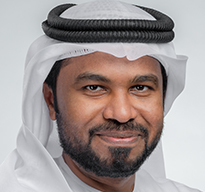Agenda
Tuesday, January 12
Keynote Speaker(s):

Mohamed Al Marzouqi
Senior Vice President, Development Function
ADNOC
Recent and future advancements in reservoir characterisation, ever increasing powerful simulation models, new technologies, new surveillance tools and methodologies, progress towards smart oil field solutions, associated huge data bases creating data overload difficult to fully exploit, upcoming AI and machine learning advances, all combine to create radical new opportunities for optimised reservoir management and field developments.
This session aims to promote best practice approaches on how to plan for and maximise value from these opportunities. The main building blocks in the process are discussed in the following sessions while here the focus is on how to efficiently put these elements together into cost efficient field development plans ensuring maximised recovery and profitability.
A central theme at this symposium is water flood excellence and reservoir life cycle management. A successful development strategy includes integrated solutions to the complete water-cycle challenges from water injection, artificial lift, water production, treatment, and re-injection/disposal.
Topics could include the importance of reservoir characterisation, simulation model building, improved history matching methodologies, and how to ensure that learning from the above mentioned building blocks are fully utilised in “real time” through an efficiently managed multidisciplinary approach. Best practice approaches for reservoir models then can rapidly include and profit from the large and constantly evolving data streams are welcome. Furthermore, case studies of advances in development concept solutions and selection criteria through reservoir model predictions, uncertainty analyses, risk mitigation plans will be promoted.
The session will focus on well design that can manage water flood to improve the sweep efficiency, overall field production and ultimate recovery.
Well engineering has significant influence to achieve successful water flooding. Hence, suitably designed injector and producer wells are necessary to manage reservoir behavior plus changes over time to improve sweep efficiency. The effectiveness of the IOR technique will then typically have an influence on the success of any future EOR schemes.
Topics of discussion in the session will include:
- Strategy and Economics
- Geo-Mechanics and Potential Impacts
- Well Drilling Challenges
- Upper and Lower Completion Design
- Subsurface Solutions to Maximise Efficiency of Flood
- Material Selection for Full Well Life-Cycle
- Water Quality and Injectivity
- Well Performance and Flow Assurance
- Artificial Lift
Adequate well functionality to manage water outflow or inflow and subsequent liquid loading are key requirements to optimise life cycle profitability. Hence, the sessions will also cover the application of advanced technologies that can add significant value for long-term performance.
The objective of this session is to share and understand the challenges and industry best approaches to develop complex reservoirs covering subsurface solutions. One of the most attractive technologies is the maximum reservoir contact (MRC) that provides greater cost optimisation through reduced well count and increased reservoir contact especially for tight and thin reservoirs. In addition, the main benefit of MRC well is to maximize the productivity/injectivity per well while reducing project capital expenditure (CAPEX) in terms of drilling and surface facilities costs. Further MRC technology also helped in reducing any potential anti-collision issues with current and future wells.
Also, it is intended to discuss the lower completion strategies covering different types of lower completion such as; ICDs, ICVs and (LEL) limited entry liners to ensure full lateral accessibility in order to gain reservoir management data to understand well and reservoir behaviors and to achieve effective acid stimulation. In addition, deployment of lower completion design is enabling to achieve uniform flow profile and to provide capability for modifications by Rigless solutions.
Well complexity keeps increasing over time and so is total well construction time. For any such project to be successful, it is necessary to integrate many engineering disciplines and diverse types of partners in a behavioral and business environment supporting team work and innovation. The aim of this session is to explore ways of thinking and steps needed to boost performance at higher levels, understand how to leverage new strategic models of partnerships to withstand challenging economic conditions, all aimed at delivering projects on budget without jeopardising project integrity, service quality and most important of all, HSE. The focus will also be on those cost-effective operational performance improvement initiatives including risk management and lessons learnt that need to be implemented from appraisal to well abandonment
Wednesday, January 13
Globally the oil and gas industry seeks to increase hydrocarbon recovery using a variety of IOR and EOR techniques. This then requires appropriate strategies to be developed and managed throughout the reservoir life cycle from initial development choices to ramp-up and maintenance of production plateau to optimisation of recovery in late life. The applied strategies can have a significant effect upon achievable recovery as well as economics when fields mature and production changes as water cut develops to become the majority of the gross production under a water flooding IOR scheme. This change brings significantly more challenges from a sub-surface and surface perspective. To deliver optimal reservoir management requires a multi-disciplinary approach incorporating an understanding from reservoir, wells and facilities to ensure technically and commercially successful solutions are applied.
The session will set the scene with experiences and insights from global companies on the differing applied strategies to address the numerous upstream and downstream challenges during reservoir transformation.
Unlike conventional prospects, the unconventional plays including tight sands and shale oils are extremely complex. Economic development of these reservoirs require deployment of proper field development planning, execution and most importantly management strategies. Some of the key factors for success in developing these prospects is proper reservoir characterisation and understanding of the sweet spots. Consequently, develop appropriate strategies for connecting, exploitation and managing production economically. Application of adequate advanced technologies like horizontal wells, multilaterals and extended reach multi-contacts along with multi-stage frac can positively impact the project efficiency. Deployment of completion diagnostics is an enabler for drilling and completion validation. Innovative real-time reservoir-monitoring technologies are continuously improving reservoir understanding, accurate short and long-term production forecasting and lower OPEX. Further advancement in these technologies can lead to even better success in managing these complex and tight reservoirs. This session is aimed to capture the current best practices in enhancing and sustaining production from tight and complex reservoirs.
The Key Topics of Interest are:
- Advances in reservoir characterisation methodologies
- Well architecture, placement and completions strategies and execution
- Horizontal, multi-lateral & extended reach drilling
- Multistage stage fracking
- Advances in drilling technologies including underbalanced drilling/managed pressure drilling
- Drilling and completion cost optimisation
- Surveillance and monitoring techniques
The sessions on Operations will focus on challenges related to optimizing and maintaining the water flooding process. The participants are expected to be exposed to the matters and industry best practices relating to operating injection, production, and disposal wells in an efficient manner. We are expecting discussion leaders focusing in the following areas:
- Water Quality and Compatibility
- Well Performance, Operations, and Production
- Well Intervention Tools and Challenges
- Profile Modification in Injection Wells to Optimize the Outflow
- Water Shut off in Production Wells to Reduce Water Cut
- Workover Operations and Challenges
- Well Integrity of Injection and Disposal Wells
- Well Stimulation to Enhance Injectivity
- Selection, Operation, and Optimization of Artificial Lift
- Life-Cycle Flow Assurance Including, but Not Limited to, Scale and Corrosion Management.
For decades, water flooding has been the preferable process to displace hydrocarbons by maximizing the recovery factor; in effect, it is considered the most cost-effective IOR mechanism.
Ensuring oil production mandates in brown fields is getting more challenging as the reservoirs mature. Nevertheless, an improved surveillance of the process is vital to succeeding in water flood excellence and capitalizing the reservoir understanding. It is undoubtedly important to understand water flow patterns through tailored data acquisition in order to properly design sourcing or treating systems and evaluate the system performance.
This session is intended to encourage discussion on utilization of many advanced reservoir surveillance tools and techniques that operators and service companies have deployed to:
- Maximize Sweep Efficiency
- Facilitate Proactive Decisions
- Accelerate Data Acquisition
- Improve Reservoir Monitoring Programs through Value of Information criteria
- Maintain Healthy Reservoir Performance
- Manage Subsurface Influxes
Best practices of leveraging existing or new technologies that improve water flood efficiency will also be discussed that include:
- Cost-effective Surveillance methods.
- Case Hole Measurements/Sampling.
- The impact of tracers technologies on the sweep efficiency maximization and better characterization of reservoir
Thursday, January 14
One solution to the challenges facing the upstream oil and gas industry today is to make better use of the data and expertise we have within our industry by getting the right information to the right people at the right time and by redefining how we use collaboration to drive our work. The session aims at exploring how digital transformation is the enabler for harvesting collaboration to optimize efficiency and production. Focus would be on some key facts including: (1), those transformative workflows and multi-dimensional ecosystems that are helping to improve collaboration and productivity, (2), the operating models including their scaling and rethinks of business change management needed, (3), system-level optimization and foundation technology platforms needed to develop and sustain these digital enablers and, (4), the speed of adoption of these digital technologies will be rate limited by cyber security. What are the cyber security tools needed to prevent a stall to the transition to these new digital technologies and transformative workflows?
Identifying, predicting, and understanding conformance problems are vital aspects of effective reservoir management practices in water flooded reservoirs. Improving reservoir conformance will always result in incremental and accelerated oil production. Properly designed and executed conformance improvement strategies and techniques can lead to greatly improved recovery. Various conformance techniques include water shut-off, gas shut-off and in-depth conformance controls which in most cases uses speciality chemicals that aid in enhancing the conformance of the injectant fluids into the reservoir.
For decades, water flooding has been the preferable process to displace hydrocarbons. In effect, it is considered the most cost-effective IOR mechanism. Nevertheless, a key aspect to a successful water flood is to design the most appropriate surface facilities to cater for water supply, water handling and treatment, water injection requirement and water disposal. Maintaining water quality is important to sustain reservoir-fitted injectivity, reduce corrosion, and minimize plugging. In addition, improved surveillance of the process is vital to achieve water flood excellence. It is undoubtedly important to understand water injection and production rates from frequent monitoring in order to design sourcing or treating systems and evaluate the overall system performance. This session will focus on:
- Water displacement efficiency improvement by accelerating data acquisition and improve reservoir monitoring programs
- Proper metering technologies to help monitor the water flood performance and to overcome the uncertainty associated with well allocation.
- Surveillance programs that includes water quality analysis, corrosion control, and computerized preventive maintenance scheduling for the plant facilities.
- Maintain healthy reservoir performance and managing subsurface water inflow and outflow
- Water sources for injection (e.g. sea water, aquifer, produced water, etc.) and the required surface facilities treatment technologies and how to improve the asset utilization.
- Use of digitalization in order to maximize the value of the water treatment by monitoring the assets behavior and use of data analytics to ensure healthy operational conditions
- Flow assurances challenges applied to water treatment like ultrafiltration, chemical treatment and chemistry compatibility studies (corrosion inhibitor, anti-scale, lime softening, etc.)
